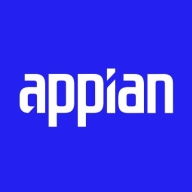

Appian and WorkflowGen compete in the business process management category. WorkflowGen seems to have the upper hand with its comprehensive feature set, providing better value for users.
Features: Appian focuses on rapid development, robust automation with low-code solutions, and seamless integration. WorkflowGen offers a customizable form builder, a powerful workflow engine, and flexibility for complex processes, making it a versatile choice for enterprises looking for comprehensive customization.
Ease of Deployment and Customer Service: Appian’s cloud-based deployment allows for quick setup and easy scalability, supported by responsive customer service. WorkflowGen’s deployment options include on-premise and hybrid, requiring more initial setup but providing greater control and security. Appian’s smoother deployment and efficient customer service offer advantages for companies needing rapid implementation.
Pricing and ROI: Appian’s pricing is structured for scalable options, aiming for high ROI through efficiency in automated processes. WorkflowGen may involve higher initial setup costs but offers long-term ROI with adaptable solutions that provide value through customization. Appian provides cost-effective entry points, while WorkflowGen's investment might yield better returns for those requiring tailored solutions.
| Product | Market Share (%) |
|---|---|
| Appian | 5.8% |
| WorkflowGen | 1.2% |
| Other | 93.0% |

| Company Size | Count |
|---|---|
| Small Business | 20 |
| Midsize Enterprise | 9 |
| Large Enterprise | 42 |
Appian is a unified low-code platform and solution used by businesses to build enterprise applications and workflows. This product adapts to the needs of clients and the technologies they are already using to combine their data in a single workflow and maximize resources. The platform has four main components through which it transforms the work process for companies of various sizes. They are:
Appian is utilized across a diverse set of industries, including automotive and manufacturing, energy and utilities, education, financial services, telecom and media, transportation, retail, insurance, healthcare, and life sciences. The most frequent use cases of Appian are customer journey, governance, risk and compliance, operational efficiency, supply chain, distributed order management, and environmental, social, and governance (ESG) management.
Appian Features
Appian has various features that allow users to create solutions for their businesses. These features can be separated into a few groups according to function, including automation, low-code application development, and integrations and data. Some of the most frequently used features of Appian include:
Appian Benefits
The benefits of using Appian include:
Reviews from Real Users
A practice leader - digital process automation at a computer software company values Appian highly because the product is easy to develop, low-code, and has a good user interface.
Alan G., an advisory board member at Codecon VR, Appian offers a clear application life cycle, easy to learn documentation, and comes with a fundamentals course.
Immediately accelerate business process adaptability with fluid workflow automation. Use the WorkflowGen .NET workflow software's low code environment to maximize the efficiency of process designers and developers.
Automate any type of human and system-based enterprise process within a battle-tested infrastructure.
Customize and integrate your workflow apps to meet your requirements in a highly configurable environment.
Engage process participants with a full-featured workflow portal, native mobile apps, and email approvals, or through seamless integration with your own web apps.
Leverage a solution used by Fortune 500 companies for worldwide business-critical applications.
We monitor all Low-Code Development Platforms reviews to prevent fraudulent reviews and keep review quality high. We do not post reviews by company employees or direct competitors. We validate each review for authenticity via cross-reference with LinkedIn, and personal follow-up with the reviewer when necessary.